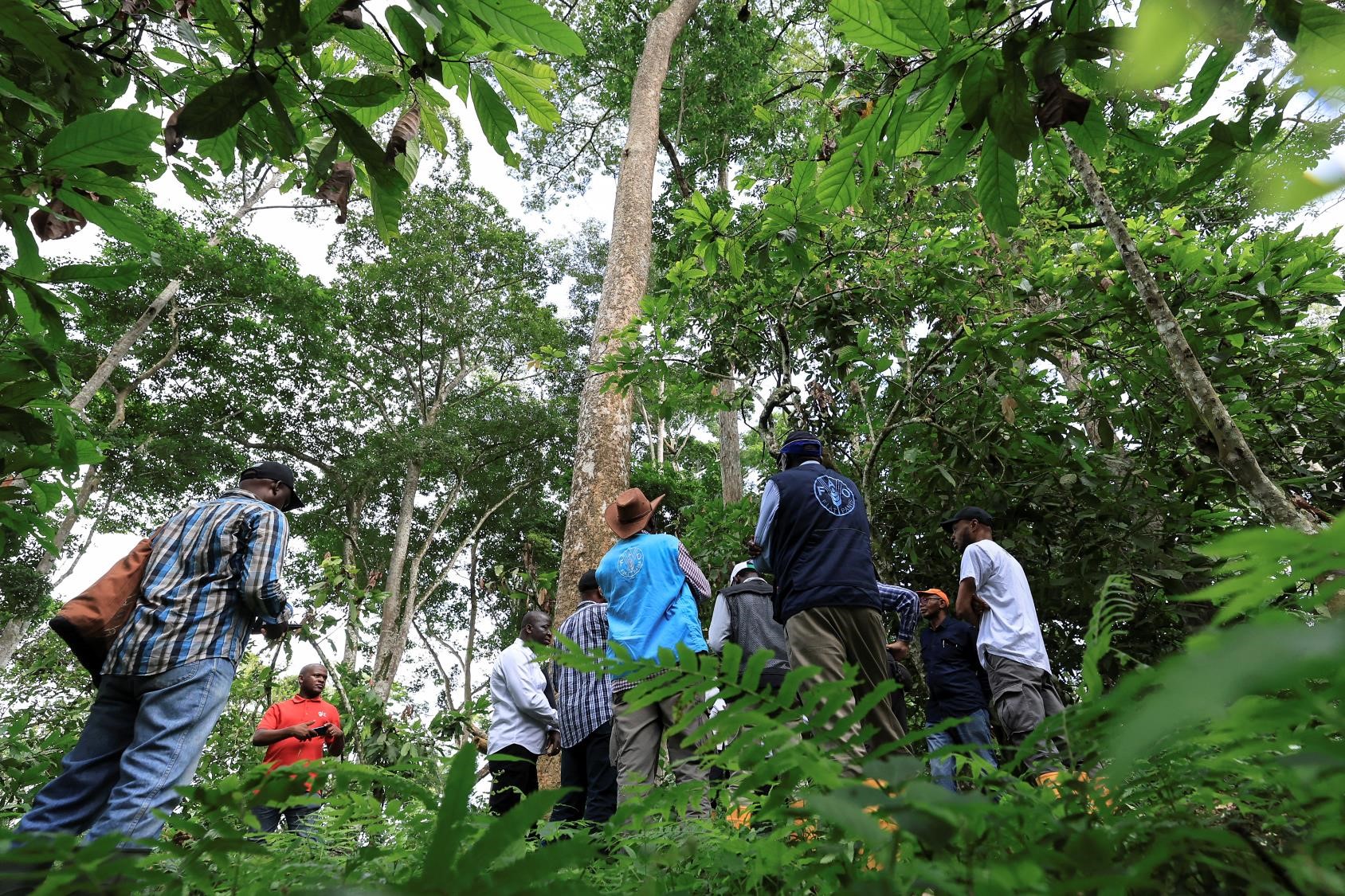The Cameroonian model in agroforestry for sustainable cocoa production

Study tour participants visiting cocoa field, Cameroon
©FAO/Beloumou Olomo Daniel
From 13 to 22 October 2024, a delegation of experts, institutions and practitioners involved in promoting agroforestry in the cocoa sector in Côte d’Ivoire participated in a study tour in Cameroon. The Ivorian delegation met with producers, processors and institutions of the cocoa sector near Yaoundé.
Organised by the FAO Investment Centre in partnership with the Conseil Café Cacao of Côte d'Ivoire (CCC) and the National Cocoa and Coffee Board of Cameroon (ONCC), and with the support of the European Union, this initiative is part of efforts to promote fair and sustainable cocoa production in Côte d'Ivoire.
The Côte d'Ivoire cocoa stakeholders came to learn about the Cameroonian model in the field of agroforestry and of payments for ecosystem services. They were able to discuss with Cameroonian institutions in charge of cocoa production and marketing (Conseil interprofessionnel cacao et café, Cocoa and Coffee Subsectors Development Fund, ONCC), farmers who have adopted agroforestry practices, local communities, local and industrial cocoa processing units and scientists from various research institutions involved in agroforestry.
Under the guidance of experts specialised in the cocoa sector and agroforestry from the FAO Investment Centre, the delegation also visited cocoa-producing areas and had rich and concrete discussions on best practices and incentive mechanisms to limit deforestation linked to cocoa production in Côte d'Ivoire.
The 12-strong delegation from Côte d'Ivoire included various stakeholders from the sector: experts from the Conseil Café-Cacao, leaders from producer organisations, experts from national bodies involved in promoting agroforestry (Ministry of Water and Forests, Ministry of Agriculture and Rural Development, National Agency for Support to Rural Development) and representatives from research institutions (National Agricultural Research Centre, International Centre for Forestry Research).
“The aim was to foster exchanges, which help to bring out positive ideas and practices”, explained Mahama Zoungrana, FAO Investment Centre’s focal point on cocoa in Côte d’Ivoire. “We organised this type of visit to build the capacity of producers, cooperatives and technicians in agroforestry, so that they can then design sustainable and effective investments in these practices”.
Cameroon, the third largest cocoa producer in Africa and the fifth largest in the world, has a long tradition of growing cocoa in complex agroforestry systems, in which cocoa plants grow in the shade of other trees to receive the necessary amount of light and moisture. These systems make cocoa production more sustainable and resilient to the effects of climate change, and help to diversify the income of small farmers, while encouraging carbon sequestration and protecting biodiversity.
Agroforestry is also encouraged by the recent European regulation against deforestation and forest degradation, which will ensure that products consumed by European citizens do not contribute to deforestation or forest degradation in the world.
During the visit to Mr. Bagadema's cocoa plot in the forest area of Biatsaota 2, Ms Assata Kone Doumbia, Chairwoman of the Board of Directors of the ECAM Cooperative in Méagui (in the Soubré cocoa-growing area of Côte d'Ivoire) said: “I have realised that shaded cocoa trees not only enable sustainable production with good yields, they also require less maintenance and therefore save on labour, which is one of our major concerns these days”.
This study trip is part of the EU-led Sustainable Cocoa Initiative, implemented by several partners including the FAO Investment Centre. The EU being the main market for West African cocoa producers, its aim is to support the sector's stakeholders in their efforts to produce cocoa without deforestation or child labour, and to ensure a decent income for producers.
The Ivorian and Cameroonian cocoa actors are working together to strengthen their agroforestry practices and learn more about payments for ecosystem services. This study visit follows a rich discussion during a workshop on agroforestry organised in Brussels last April by FAO and the Cameroonian Conseil interprofessionnel cacao et café, as part of the Sustainable Cocoa Programme.
